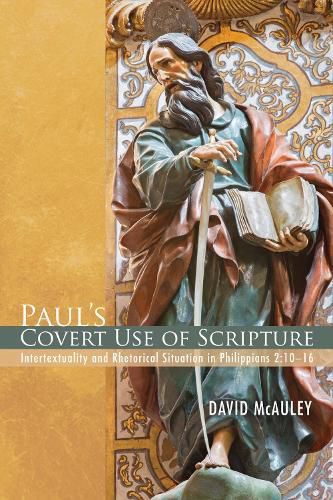Readings Newsletter
Become a Readings Member to make your shopping experience even easier.
Sign in or sign up for free!
You’re not far away from qualifying for FREE standard shipping within Australia
You’ve qualified for FREE standard shipping within Australia
The cart is loading…






This title is printed to order. This book may have been self-published. If so, we cannot guarantee the quality of the content. In the main most books will have gone through the editing process however some may not. We therefore suggest that you be aware of this before ordering this book. If in doubt check either the author or publisher’s details as we are unable to accept any returns unless they are faulty. Please contact us if you have any questions.
This book explores why and how Paul uses Scripture (Old Testament) in Phil 2:10-16. It tests the suggestion that a cluster of tacit references to specific books of Scripture is integral or foundational to Paul’s epistolary argument. If the problem in Philippi is the disinclination to accept suffering and death as intrinsic to gospel citizenship, then the muted allusions lead to a single, central theme: God’s approval of suffering and death for the sake of Christ. McAuley argues this theme is the crucial intertext that unifies and gives significance to the whole letter. Previous scholarly efforts to discover congruence between the contexts of Philippians and the Old Testament have rested on a heuristic approach focused on surface-level themes and facticities recorded in Paul’s text, leading to mixed results. In this investigation McAuley sets forth a new theoretical and exegetical framework that draws on insights from theories of intertextuality, allusion, and rhetorical situation to offer a fresh interpretation of Philippians.
$9.00 standard shipping within Australia
FREE standard shipping within Australia for orders over $100.00
Express & International shipping calculated at checkout
This title is printed to order. This book may have been self-published. If so, we cannot guarantee the quality of the content. In the main most books will have gone through the editing process however some may not. We therefore suggest that you be aware of this before ordering this book. If in doubt check either the author or publisher’s details as we are unable to accept any returns unless they are faulty. Please contact us if you have any questions.
This book explores why and how Paul uses Scripture (Old Testament) in Phil 2:10-16. It tests the suggestion that a cluster of tacit references to specific books of Scripture is integral or foundational to Paul’s epistolary argument. If the problem in Philippi is the disinclination to accept suffering and death as intrinsic to gospel citizenship, then the muted allusions lead to a single, central theme: God’s approval of suffering and death for the sake of Christ. McAuley argues this theme is the crucial intertext that unifies and gives significance to the whole letter. Previous scholarly efforts to discover congruence between the contexts of Philippians and the Old Testament have rested on a heuristic approach focused on surface-level themes and facticities recorded in Paul’s text, leading to mixed results. In this investigation McAuley sets forth a new theoretical and exegetical framework that draws on insights from theories of intertextuality, allusion, and rhetorical situation to offer a fresh interpretation of Philippians.